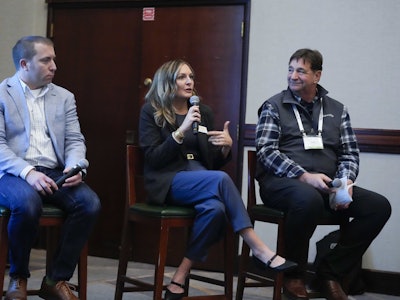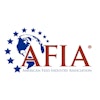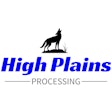
The National Grain and Feed Association’s (NGFA) Country Elevator Conference (CEC) featured a panel discussion on the digital transformation of agribusiness on December 11. More than 500 grain and feed professionals met at CEC for networking and education on industry-critical issues, such as the breakout session panel, moderated by Elise Schafer, editor of Feed & Grain.
Panelists included Keith Bangasser, lead business analyst, Levridge, Tyler Bottoms, general manager, AgVision, and Lacey Seibert, head of go-to market, Bushel. Each industry expert brought perspective on the advantages and challenges of embracing digital workflows — from accounting automation to securing data in the cloud — and how digitization is reshaping grain business operations.
A key point was the urgency of transitioning the basics, like scale tickets, customer interaction records, and payments, from paper to digital format to improve efficiency. Bottoms said contracts with e-signatures are foundational to digital transformation.
E-signatures enable immediate execution of contracts from anywhere, eliminating delays caused by physical paperwork. The advantages are particularly vital during peak periods, such as harvest, when time is of the essence.
“You need to get those grain contracts back quickly,” Bottoms said. “Otherwise, they might get lost — blown off someone’s dashboard on the road, for example.” Tyler Bottoms, AgVision.National Grain and Feed Association
Tyler Bottoms, AgVision.National Grain and Feed Association
Bottoms noted that integrating contracts with cloud-based systems improves record-keeping by logging signing, time and location details, creating a transparent audit trail.
Real-time data access and the ability for stakeholders to make decisions on the go enhance the value of cloud-based systems.
“You don’t have to wait 24 hours to know your numbers,” said Bottoms. “The cloud brings that immediacy to agribusiness operations.”
More meaningful communication
Seibert stressed the collaborative benefits of cloud systems for their ability to eliminate data silos and foster better communication between producers and agribusinesses.
“Centralized data storage ensures everyone is working from the same information, which leads to stronger relationships and more informed decisions,” Seibert said.
Improved communication with producers also allows agribusinesses to streamline transactional conversations and focus on more meaningful interactions.
“Let’s take questions about prices or moisture levels out of the picture,” Seibert said. “This way, we can focus on helping growers and making those conversations more impactful.”
Bottoms urged the industry to reconsider concerns about digitalization eroding personal connections with producers.
“It’s not about losing that one-on-one relationship,” he said. “It’s about cutting to the chase. Instead of spending 20 minutes discussing numbers, we can spend five minutes on data and the rest helping producers improve.”
Improve data security
Data security was a key theme throughout the panel discussion. Bottoms told a cautionary tale to the audience that one of his clients lost nearly a year’s worth of data in a fire because it was stored on an on-premises server.
“This could have been avoided with cloud-based backup solutions,” he said.
The panelists also cautioned against the risks associated with outdated practices like mailing checks or storing sensitive financial data on unsecured computers.
“Digitizing payment processes isn’t just about efficiency, it’s about securing your operations and maintaining customer trust,” Seibert said.
The panelists agreed that modern cloud systems provide robust protections against both cyber and physical threats, offering a level of redundancy and reliability that on-premises systems can’t match.
Facing challenges and organizational change
While the benefits of digitization are clear, the panel acknowledged the challenges involved. Cleaning up legacy data, some of which may go back decades, is a significant hurdle. However, modern ERP systems have streamlined the onboarding process.
“Onboarding a client can now take as little as 120 days,” Bottoms said. “It’s a far cry from the years-long implementations of the past.”
Seibert said digital solution providers recognize the importance of business continuity and are committed to ensuring it during a transition from traditional to digital solutions.
“We know farmers can’t pause their operations and employees can’t stop working,” Seibert said. “Bridging solutions are essential to ensure smooth operations during the switch.”
Bangasser followed with ideas to help managers ease employee transitions to new digital workflows.
“People don’t necessarily like change,” Bangasser said. “When you change a system, sometimes it’s the most traumatic to your best employees, so we deploy organizational change management (OCM).”
OCM involves identifying and communicating the goal of the deployment at all levels of the organization.
“It’s critical to address the changes needed to adapt to a system,” Bangasser said. “Listen to employees and be empathetic and supportive because when people aren’t on board, it can make a deployment more difficult.”
The discussion closed by addressing the hiring advantage of adopting digital tools that attract tech-savvy talent.
As the grain industry faces mounting pressures to improve efficiency and security, the adoption of tools like e-signatures, cloud systems and automated workflows is no longer optional — it’s essential.
“By implementing these tools, you can cut down on paper, streamline operations and improve communication — all while positioning your business for long-term success,” Schafer said.
The 2025 Country Elevator Conference will take place December 7-9 at the JW Marriot in Indianapolis, Indiana.

















